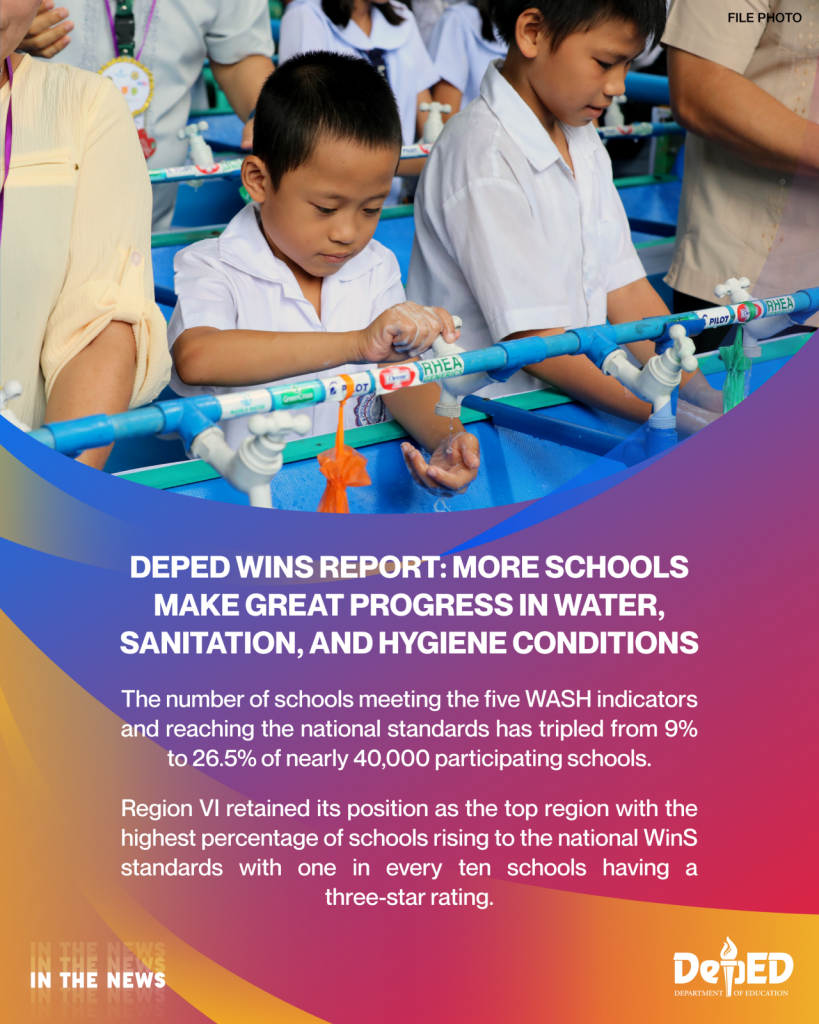 |
March 9, 2021 – For three consecutive years, the Philippines is making strides in Water, Sanitation, and Hygiene (WASH) in Schools program as participating schools recorded impressive improvement in their compliance with the five WASH indicators.
The number of schools meeting the indicators and reaching the national standards has tripled from 9% when the WASH in Schools (WinS) program started to 26.5% of nearly 40,000 participating schools, the Department of Education said in its WinS monitoring report from the School Year 2017-2018 to 2019-2020.
In congruence to the DepEd Order No. 10 series of 2016 entitled “Policy and Guidelines for the Comprehensive WinS Program,” a school has to satisfy the following requirements – safe drinking water, gender-segregated toilets, group handwashing facility with soap, daily group handwashing activities, and sanitary pads – to earn at least a star out of the three-star rating in its WinS implementation.
“Access to water, sanitation and hygiene services is important for effective infection prevention and control especially in an educational setting. Promoting handwashing activities and maintaining a safe, clean, and healthy learning environment are highly effective measures to reduce the transmission of the COVID-19 virus and other infectious diseases,” the report reads.
Meanwhile, participation in WinS monitoring has increased substantially over the three-year monitoring period, with a 10% increase (about 5,000 schools) each year. From 65.6% in SY 2017-18, it dramatically increased to 87.9% in the most recent monitoring.
Region VI retained its position as the top region with the highest percentage of schools rising to the national WinS standards with one in every ten schools having a three-star rating.
The assessment also cited improvement in public schools’ performances in areas with less investment such as water, deworming, health education, and behavioral change management like handwashing, toothbrushing routines, and regular cleaning of sanitation facilities.
According to the report, 61% of schools have available safe drinking water on school grounds, nearly two out of three schools have gender-segregated toilets, two in five schools perform supervised daily group handwashing, over half of the schools have group handwashing facilities with soap, and four out of five schools have access to sanitary pads available to students.
However, schools see sanitation infrastructure as a challenge because it demands investment and a longer time for the construction of toilet and handwashing facilities.
“The WinS program is at the core for safe reopening and operation of schools during this COVID-19 crisis,” the report adds.
As a response to the COVID-19 situation and to strengthen the observance of the pandemic preparedness and response measures, DepEd is planning to incorporate protective measures into the schools’ routines and is currently developing checklists to brief schools and gauge the readiness for the face-to-face classes.
The implementation of WASH in Schools (WinS) is in partnership with Deutsche Gesellschaft für Internationale Zusammenarbeit (GIZ), UNICEF, and Save the Children Philippines.
WinS is one of the flagship programs under the Oplan Kalusugan sa DepEd, a convergence initiative of DepEd’s health and nutrition programs.
END


